democracynow.org
Stories
 Florida State Attorney Who Oversaw Trayvon Martin & Marissa Alexander Cases Is Defeated in Primary
Florida State Attorney Who Oversaw Trayvon Martin & Marissa Alexander Cases Is Defeated in Primary
In Florida, State Attorney Angela Corey has been defeated in her re-election bid. Corey had faced widespread criticism for her handling of several prominent cases, including the killing of African-American teenager Trayvon Martin by white neighborhood watch vigilante George Zimmerman and the case of Marissa Alexander, who was sentenced to 20 years in prison for firing what she maintains was a warning shot at her abusive husband. For more, we speak with freelance journalist Victoria Law. Her recent piece for The Nation is "Why Is Marissa Alexander Still Being Punished for Fighting Back."
TRANSCRIPT
This is a rush transcript. Copy may not be in its final form.
AMY GOODMAN: On a semi-related issue, I wanted to ask you, Victoria, about the piece you wrote in The Nation, "Why Is Marissa Alexander Still Being Punished for Fighting Back?" the famous case of the woman who fired a warning shot at her abusive husband. She was sentenced—what was it?—to 20 years in prison.
VICTORIA LAW: Twenty years in prison.
AMY GOODMAN: This was right around the time of Trayvon Martin. Now, the prosecutor, state attorney in Florida’s Fourth Judicial Circuit Court, Angela Corey, was just defeated in yesterday’s primary.
VICTORIA LAW: Yes. We can see that oftentimes, as we see in—as, hopefully, we do not see in Bresha’s case in the end, but as we see with many domestic violence survivors, that when they take actions to protect themselves, and almost always it’s self-defense, even if it’s not happening in the heat of the confrontation, but they see something in their abuser’s eyes, and they say, "This is it. You know, if I don’t do something, I’m going to end up dead. He is going to kill me." And we see that prosecutors tend to go after them. Domestic violence is often dismissed as, quote-unquote, "the abuse excuse." It’s disregarded. There is still not widespread recognition of the ways, the insidious ways, in which domestic violence works. So, they might say, "Well, why were you afraid of him if you weren’t being hit all the time?" And after a while, it’s not just the physical violence, it’s the threat of physical violence; it’s being conditioned to fear your loved one and to do what you need to do in order to avoid violence.
But we see, with Angela Corey charging Marissa Alexander, prosecuting her, and adding, at her discretion, the mandatory sentencing that allowed her to be sentenced to 20 years in prison, and then, when Marissa Alexander won her appeal, going after her again and threatening her with a 60-year sentence for firing a warning shot, in which no one was hurt and no one was killed—we see this again and again. What’s unusual with Marissa Alexander is the outpouring of support she got.
AMY GOODMAN: And again, Angela Corey defeated.
VICTORIA LAW: Yes.
AMY GOODMAN: And this is the same prosecutor who was in charge of the prosecution of George Zimmerman, who got off.
VICTORIA LAW: Yes.
AMY GOODMAN: I want to thank you all for being with us. We’ll continue to follow Bresha’s case. Victoria Law, we’ll link to your pieces. Martina Latessa, thanks so much for being with us, Cleveland police detective in the Domestic Violence Unit, who is the aunt of Bresha, and Ian Friedman, her criminal defense attorney.
This is Democracy Now! When we come back, speaking of primaries yesterday, we’ll look at the primary results in Florida and in Arizona and in other places, with Jim Dean, head of [Democracy] for America. Stay with us.
... Read More → A New McCarthyism: Greenwald on Clinton Camp's Attempts to Link Trump, Stein & WikiLeaks to Russia
A New McCarthyism: Greenwald on Clinton Camp's Attempts to Link Trump, Stein & WikiLeaks to Russia
Pulitzer Prize-winning journalist Glenn Greenwald says Democrats have adopted a "Cold War McCarthyite kind of rhetoric" by accusing many its critics of having ties to Russia. "It’s sort of this constant rhetorical tactic to try and insinuate that anyone opposing the Clintons are somehow Russian agents, when it’s the Clintons who actually have a lot of ties to Russia, as well," Greenwald said. "I mean, the Clinton Foundation and Bill Clinton helped Russian companies take over uranium industries in various parts of the world. He received lots of Russian money for speeches."
TRANSCRIPT
This is a rush transcript. Copy may not be in its final form.
AMY GOODMAN: And when it comes to Russia, I mean, you have this very unusual juxtaposition. Talk about the Democrats’ approach, Hillary Clinton’s approach, to Putin, and also Donald Trump. I mean, his recently departed, from the campaign, at least, campaign manager, Paul Manafort, his close ties to Ukraine and to the Soviet ally former president, Yanukovych, in Ukraine, who then fled to Russia, and whatever the—not clear what his financial dealings were with them. But talk about Russia as it relates to U.S. foreign policy.
GLENN GREENWALD: To me, this is one of the more remarkable things of this campaign, which is that any of us who grew up in politics or came of age as an American in the ’60s or the ’70s or the ’80s, or even the ’90s, knows that central to American political discourse has always been trying to tie your political opponents to Russia, to demonizing the Kremlin as the ultimate evil and then trying to insinuate that your political adversaries are somehow secretly sympathetic to or even controlled by Russian leaders and Kremlin operatives and Russian intelligence agencies. And this was not just the McCarthyism, which was sort of the peak of that, but even long after. This was typically a Republican tactic used against Democrats. So, if Democrats advocated greater detente with the Russians, arms deals or other negotiations with Russia to decrease tensions or decrease conflict, Republicans would immediately accuse those liberals and Democrats of advocating that, of being—either having allegiance to the Kremlin or being useful idiots or stooges of Russian leaders.
And it’s amazing to have watched, in this campaign, Democrats completely resurrect that Cold War McCarthyite kind of rhetoric not only to accuse Paul Manafort, who does have direct financial ties to certainly the pro—the former pro-Russian leader of the Ukraine, but really anybody who in any way questions the Clinton campaign. I mean, they even tried doing it to Jill Stein a few weeks ago by claiming that she had done something nefarious by attending an event in Moscow sponsored by the Russian television outlet RT that’s controlled by the Putin government. And so, it’s sort of this constant rhetorical tactic to try and insinuate that anyone opposing the Clintons are somehow Russian agents, when it’s the Clintons who actually have a lot of ties to Russia, as well. I mean, the Clinton Foundation and Bill Clinton helped Russian companies take over uranium industries in various parts of the world. He received lots of Russian money for speeches. The Clinton Foundation has relationships to them. President Obama refused to arm factions in the Ukraine that were trying to fight against this pro-Russian dictator, and continuously tries to partner with the Russians in Syria. So this rhetoric can cut both ways, and it’s very problematic, I think, to try and depict anyone who questions NATO or who advocates detente with Russia of somehow being disloyal or useful idiots or stooges to Putin, given how dangerous that rhetoric traditionally has been in American political discourse.
AMY GOODMAN: And, Glenn, where WikiLeaks fits into this picture with Russia, and then also if you could talk about Ed Snowden?
GLENN GREENWALD: I mean, what I just talked about, in terms of this tactic of trying to depict political adversaries as being agents of Russia, obviously, from the beginning of the Snowden reporting, that was used to try and demonize Edward Snowden by virtue of the fact that he ended up in Russia, where he sought and then obtained asylum. Even though he never intended to go to Russia—he was passing through Russia, and he ended up getting stuck there because the U.S. government revoked his passport on the plane from Hong Kong to Moscow—they used the—they first forced him to stay in Russia and then used the fact that he was in Russia to depict him as some kind of a nefarious Russian agent.
And they’ve done the same to WikiLeaks, especially since WikiLeaks disclosures this year have been damaging to the Democratic Party and the Clinton campaign. I mean, it’s amazing that WikiLeaks’s last disclosure resulted in the resignation of the top five officials of the Democratic National Committee, including the DNC chair, Debbie Wasserman Schultz. So WikiLeaks has become an enemy of the Democratic Party, and they seem to have one tactic with their adversaries and enemies, which is to accuse them of being Russian agents. And that’s the tactic that has now been used against WikiLeaks, as well.
And so, it’s a very sort of disturbing strategy that not is just disturbing in and of itself, but that will have enduring consequences in the likely event that Hillary Clinton wins, because when you constantly inflame the public by telling them that Russia is this enemy, that they have domestic agents operating in the U.S., namely anyone who is a critic of the Clinton campaign, that’s going to have lots of long-term implications in terms of how the U.S. government treats Russia, how the American media and the American people are going to expect the U.S. government to react to Russia and how much dissent and criticism is going to be allowed without people being accused of being agents of the Kremlin.
AMY GOODMAN: And what about Donald Trump and his admiration for Putin, and how you think he would deal with Russia?
GLENN GREENWALD: So, again, I think that Donald Trump comes from this ideological tradition, to the extent that he has any cogent views at all, that says that the United States should get along with the world’s dictators, unless those dictators directly threaten the United States. And it’s a little bit hard for me to take seriously complaints that Donald Trump wants to get too close to Putin, who’s a dictator or an authoritarian, when the closest allies in the world of the United States government are themselves dictators and tyrants, beginning with the Saudi regime and going throughout that region and into lots of other regions, as well. Cuddling up to dictators has long been and continues to be a central U.S. policy.
I do think that Trump’s admiration of Putin is sort of personal, in that Trump personally admires what he regards as this sort of fascistic strength, this kind of assertion of will and this ability to command and rule, that does reflect very negatively, in fact kind of alarmingly, on Trump’s personality, the parts of his personality that result in admiration for Putin. So I think there are genuinely disturbing aspects of it.
But the fact is that there’s a lot of people who think that the United States should not be seeking out tension and conflict with Russia. And ironically, the person who has probably done the most to reduce tension between the U.S. and Russia is the person who currently occupies the White House: Barack Obama. And so, I think it’s important to leave space in American political debate to advocate for greater cooperation with Russia without having your loyalties or sympathies called into question.
AMY GOODMAN: You know, we mentioned in the first part of our conversation what’s happening in Israel and Palestine. You write that Clinton-led Democrats are now "to the right of George W. Bush" when it comes to Palestinian rights. Explain what you mean.
GLENN GREENWALD: The fact that Israel is illegally occupying the West Bank is a consensus of international law. And not only is it a consensus of international law, but George Bush himself, as steadfastly supportive of Israel as he was, often said that Israel’s occupation of the West Bank was illegal, and he used those terms. So did the Bush administration. That was its formal position.
During the platform debate of 2016 within the Democratic Party, when several Sanders appointees, led by Cornel West and James Zogby and others, attempted to insert language into the platform that simply reflected this international consensus—namely, that Israel was occupying the West Bank illegally and that the U.S. government opposes it—the Clinton appointees on this platform committee, including Neera Tanden, who will now head the transition and currently heads the Center for American Progress, and other witnesses and appointees were opposed to that and objected to it and actually blocked the inclusion of that language. And so, apparently, it’s the current position of the Clinton-led Democratic Party that you can’t or should not use the term "occupation" to describe what Israel is doing in the West Bank, even though that is the international consensus and even though the Bush administration itself was willing to embrace and use those terms. And that does place the Democratic Party, unsurprisingly, to the right of not just the international community, but even the Bush administration, when it comes to their blind, slavish, incredibly immoral support for the Netanyahu government.
AMY GOODMAN: So, Glenn Greenwald, your view of third parties? I mean, you talk about Jill Stein. There’s the whole debate over the debates, who gets to participate in the debates, which, of course, it’s a self-fulfilling cycle, because if you get in the debates, you get much more well known, and you have a national platform that is viewed by millions of people. But what do you think about both Johnson, the former governor of New Mexico, and Dr. Stein, the Green Party candidate? Johnson, of course, the Libertarian, Gary Johnson.
GLENN GREENWALD: I think—yeah, I think American political discourse would value greatly from the inclusion of both of them in the debates, which is exactly why neither the Democratic nor the Republican Party will allow it. What—the big scam of the Democrats and Republicans is that they agree overwhelmingly on most issues. It doesn’t seem like that’s the case, because that’s the scam. The issues on which they agree, such as giving billions of dollars of taxpayer money to Israel each year, are simply ignored, so you don’t realize the issues on which they have agreement, because those issues are ignored by television commentators and don’t get debated. And then there are issues where they vehemently disagree, whether it be like abortion or LGBT issues or the rate of taxation or healthcare, that do get attention, and so it seems like they disagree on everything, because the only issues that get any attention are the ones where they vehemently disagree.
Allowing third parties and four-party candidates into the debate, who would then call into question U.S. posture toward Israel or the drug war or the criminal justice system or a whole variety of other issues where both parties agree, including trade, would open up the range of issues that Americans start questioning and start thinking about and start challenging, that they never think about now because the two major parties agree. And I’ve watched here in Brazil, for example, where there’s all kinds of parties, and eight or 10 parties, or six parties participate in the presidential election, so you have far-left and far-right and center parties, where all views get aired. And you contrast that to the United States, where a tiny range of issues get debated, because only two sides are heard, and that’s exactly the way both parties want it.
AMY GOODMAN: Pulitzer Prize-winning journalist Glenn Greenwald of The Intercept, speaking to us from his home in Rio de Janeiro, Brazil. You can visit our website to watch the first part or our interview, when we talked about the impeachment trial of Brazilian President Dilma Rousseff, Bernie Sanders’ opposition to the coup in Brazil, the Clinton Foundation and the future of Rio after the Olympics.
... Read More →Glenn Greenwald: Obama Has Bombed 7 Nations, But Clinton Claims He Has Not Been Militaristic Enough
Pulitzer Prize-winning journalist Glenn Greenwald looks at the foreign policies of Hillary Clinton and Donald Trump. "You have President Obama, who himself has been very militaristic—he has bombed seven predominantly Muslim countries in the last seven years—and yet Secretary Clinton’s critique of his foreign policy is, in every case, that he’s not aggressive enough, he’s not militaristic enough," Greenwald said. "And in Syria, in particular, they seem to really be itching to involve the U.S. a lot more directly and a lot more aggressively in that conflict."
TRANSCRIPT
This is a rush transcript. Copy may not be in its final form.
AMY GOODMAN: This is Democracy Now!, democracynow.org, The War and Peace Report. I’m Amy Goodman. We’re continuing our conversation with Glenn Greenwald, the Pulitzer Prize-winning journalist, one of the founding editors of The Intercept. In Part 1, we discussed the U.S. elections, also the impeachment trial of the suspended Brazilian President Dilma Rousseff. Today we’re going to Part 2 of the conversation.
Glenn Greenwald recently wrote an article, "Hillary Clinton’s Likely Pentagon Chief Already Advocating for More Bombing and Intervention." We spoke to him at his home in Rio de Janeiro, Brazil, and I asked Glenn to talk about the article and just who Michèle Flournoy is.
GLENN GREENWALD: She, by all accounts, is the clear front-runner to be the Pentagon chief under Hillary Clinton. She was probably the second-place finisher the last time that President Obama chose a Defense Department chief, when he chose Ash Carter. She’s sort of this prototypical Pentagon technocrat, who has been integrated into bipartisan military policy for a long time, so very much along the lines of how Hillary Clinton views foreign policy and military policy.
And one of the most notable parts of Clinton’s approach to foreign policy that has gotten relatively little attention is that one of the few areas where she has been openly critical of President Obama has been by complaining that he’s been insufficiently militaristic or belligerent or aggressive in a number of areas, in particular, in Syria, where she criticized him in her book and then also in various interviews for not doing enough in Syria to stop the Syrian dictator, Assad, from brutalizing the Syrian people. She has advocated—Secretary Clinton has—a no-fly zone, which could lead to military confrontation with Russia, who’s flying over Syria. And then Michèle Flournoy, in an interview, made clear that she not only believes in a no-fly zone, but also more active boots on the ground in Syria, American boots on the ground.
And given that the Russians are already there, that there is ISIS there, that there are al-Qaeda elements, that there’s still a civil war ongoing, it would be extremely dangerous to involve the U.S. further in military involvement in Syria. And yet, you have President Obama, who himself has been very militaristic—he has bombed seven predominantly Muslim countries in the last seven years—and yet Secretary Clinton’s critique of his foreign policy is, in every case, that he’s not aggressive enough, he’s not militaristic enough. And in Syria, in particular, they seem to really be itching to involve the U.S. a lot more directly and a lot more aggressively in that conflict.
AMY GOODMAN: And how do you think Donald Trump’s foreign policy would be carried out?
GLENN GREENWALD: It’s always difficult to say what Donald Trump’s policy would be, because he has very few cogent ideas that remain constant from one day to the next. But if there’s any ideological strain that’s identifiable in Trump’s statements, not just over the campaign but over the year—the years, it does seem to be that he comes from this kind of more nativist, isolationist strain of American politics represented by Pat Buchanan, previously by Charles Lindbergh, this American-first ideology that says that the U.S. should never involve itself in military conflicts to nation-build or to help people or to prevent oppression; it should only do so when there’s a direct threat to the United States that needs to be engaged.
And so, Trump’s attitude has very much been along those lines in Syria, which is to say, "Let the Russians continue to bomb ISIS. Let the Russians continue to bomb Assad’s enemies," many of whom, in Trump’s view, are al-Qaeda elements. "There’s no reason for the United States to engage in any of that. And the only thing the U.S. should be doing in Syria," he says, "is directly attacking ISIS," where he wants even greater bombing than Obama has already ordered.
And so, in one sense, he’s calling for more limited involvement in Syria by limiting the United States’ military action only to ISIS and letting the Russians handle everything else, but on the other hand, he’s calling for massive bombing, the use of torture, other forms of war crimes in killing, targeting suspect—terror suspects’ family members, in order to fight ISIS. And so, it’s very difficult to say whether it’s more militaristic or less. It’s probably some combination of both, to the extent that it can be predicted at all.
... Read More →
A young girl who shot dead her abusive father now may face life in prison, sparking national outcry over the treatment of domestic violence survivors. On July 28, 14-year-old Bresha Meadows allegedly killed her father, Jonathan Meadows, with a bullet to his head as he slept. Only two months earlier, Bresha had run away from home, telling relatives that she was scared for her life ”because her father was beating her mother and threatening to kill the whole family." Bresha’s father reportedly made life for his family a living hell, routinely attacking his wife—Bresha’s mother—breaking her ribs, puncturing her blood vessels, blackening her eyes and slashing her body. Jonathan Meadows’ siblings have denied allegations of domestic violence. His brother told Fox 8 News, "This has nothing to do with abuse," and his sister Lena Cooper called his death "cold and calculated." For more, we speak with freelance journalist Victoria Law, whose recent article for Rewire is "What Bresha Meadows, Arrested for Shooting Her Father After Reported Abuse, Faces Next." And we speak with Bresha Meadows’s aunt, Martina Latessa, and Bresha’s lawyer Ian Friedman.
TRANSCRIPT
This is a rush transcript. Copy may not be in its final form.
AMY GOODMAN: A young girl who shot dead her abusive father now may face life in prison, sparking national outcry over the treatment of domestic violence survivors. On July 28th, 14-year-old Bresha Meadows allegedly killed her father, Jonathan Meadows, with a bullet to his head as he slept. Only two months earlier, Bresha had run away from home, telling relatives she was scared for her life, quote, "because her father was beating her mother and threatening to kill the whole family," unquote. This is Bresha’s aunt, Sheri Latessa, speaking to WKBN in Cleveland.
SHERI LATESSA: He controlled her, and it was like she was in jail. They’ve all been through it. And nobody in that county that we called would do anything for those kids. She told on him. You tell the kids to tell. And then, what happened? Nobody did anything. She told. She did what she was supposed to do. That this was wrong—she even knew it was going wrong, what was going on her whole life, and nobody helped her.
DAVE SESS: There is a murder charge against the child.
SHERI LATESSA: Yeah, and that’s ridiculous. She, if anything, did it for her mother. She definitely did it for her mother. She said, "Now, mom, you’re free."
AMY GOODMAN: Bresha’s father, John Meadows, reportedly made life for his family a living hell, routinely attacking his wife, Bresha’s mother, by breaking her ribs, puncturing her blood vessels, blackening her eyes and slashing her body. Meadows reportedly once punched his wife so hard that she heard her teeth crack. Later, she had to have those teeth removed. He also apparently slammed her head into the wall, stomped on her and kicked her in the face.
Jonathan Meadows’ siblings have denied allegations of domestic violence. His brother told Fox 8 News, "This has nothing to do with abuse," and his sister Lena Cooper called his death "cold and calculated."
JAMES BLOUNT: He drank a little bit. He had the ways he did things. But my brother would—I’ll literally say, he would have given his life.
LENA COOPER: This was cold and calculated. My brother was murdered. It was cold and calculated. He was murdered in his sleep. There was no signs of abuse.
AMY GOODMAN: On Tuesday morning, supporters and family members gathered for Bresha’s first pretrial hearing. Over 6,000 people have signed a petition calling on Trumbull County prosecutors to drop charges against the child. Bresha is being held in a juvenile detention center in Warren, Ohio, where she faces aggravated murder charges—a charge that could carry a life sentence if she’s tried and convicted in adult court. Bresha just spent her 15th birthday behind bars.
Well, for more, we’re joined right now by three guests. In Cleveland, Ohio, we’re joined by Martina Latessa, Bresha Meadows’ aunt and a Cleveland police officer in the Domestic Violence Unit. We’re also joined by Ian Friedman, a criminal defense attorney representing Bresha Meadows. He’s an adjunct law professor at Cleveland-Marshall College of Law. And here in New York City we’re joined by Victoria Law, freelance journalist, author of Resistance Behind Bars: The Struggles of Incarcerated Women. Her recent article for Rewire is headlined "What Bresha Meadows, Arrested for Shooting Her Father After Reported Abuse, Faces Next."
We welcome you all to Democracy Now! Victoria, just lay out this story for us. When did this happen? How old was Bresha? And talk about what’s happened since.
VICTORIA LAW: So, on July 28th, Bresha Meadows, who was then 14 years old, so a child, was arrested for allegedly shooting her abusive father in the head with a gun that he had used to threaten his family numerous times. So, she had endured years and years of abuse. According to Bresha’s mother, the abuse had started when she was pregnant with her first child, who is now 21 years old, so she had endured decades of abuse. And this was a—violence and threats and belittlement and ridicule were a constant in Bresha’s house. She had run away twice. Her aunt had reported the abuse to child services. Nothing ever came of that. Her mother had tried to leave once before, and had even filed for an order of protection. As many of your viewers may know, in situations involving domestic violence, it often takes somebody seven to 10 times to leave before they are able to successfully leave their abuser. And as we’ve seen in many cases, leaving is often the most dangerous time, for a survivor and her family to leave an abuser.
AMY GOODMAN: And so, then explain the night that Bresha killed her father.
VICTORIA LAW: So, Bresha’s father was sleeping. He had come home earlier that day. She had gone into her room to avoid the abuse, from what I understand. And he—when he went to sleep—nobody is sure, and I don’t know if her lawyer can give more details or wants to give more details at this time, since she is still pretrial—he was sleeping, and she shot him with the gun that he used to threaten his family. And again, this is—if you put yourself in the eyes—in the shoes of a 14-year-old, she saw this as a last resort. Nobody else was helping her. The police weren’t helping her. Child Protective Services weren’t helping her. None of the adults in her life seemed to be able to help her and her family.
AMY GOODMAN: Ian Friedman, you’re her criminal defense attorney. Can you talk about what happened in Tuesday’s pretrial hearing? And how long has Bresha now been held in prison, in jail?
IAN FRIEDMAN: Good morning, Amy, and thank you for having me on. But more than that—excuse me—thank you for finding this issue to be so important. As we talk about it, it really is just such a tragedy. And what I have learned, even just in the short time I’ve been involved, is just how widespread this sort of violence is out there. So, I’m really glad we’re talking about it this morning.
Yesterday at the pretrial, what we did was we just exchanged evidence—the defense, the prosecution. We talk about where we’re going with the case, potential resolutions. We set future dates. And we really are just discussing kind of the beginning of the procedure.
So, Bresha has been in the juvenile detention center since that night, the night of the incident. She will remain in there at least until the next pretrial, which will be October 6th. And at that time, we’ll revisit whether or not there is cause to have her released while the rest of the case remains pending.
AMY GOODMAN: So how long has she been jailed at this point?
IAN FRIEDMAN: She’s been jailed now over a month; since the night of the incident, she’s been in there.
AMY GOODMAN: Martina Latessa, you are Bresha’s aunt. Can you talk about what you understood before that night?
MARTINA LATESSA: I understand that there were mental abuse, physical abuse, psychological abuse, emotional abuse. The kids didn’t get, you know, hit—that was my sister Brandi who got that—but those kids had to watch that, including Bresha. They had to sit there, and he did cuss at them and call them names. From my understanding, Bresha wasn’t even allowed to be in the same room as her father, once she ran away the second time. He would tell her, "Get out of here. Go up in your room. Get out of my face. You know, you disgust me." My sister Brandi was abused, pushed around and punched and smacked and kicked, while all of her children watched. And it did take a toll on her. She did run away. And she, you know, told me about it, and she expressed great fear for herself and her family.
AMY GOODMAN: I want to turn to your sister for a moment, to Brandi Meadows, Bresha’s mother, who spoke to Fox 8 Cleveland. She called Bresha her hero.
BRANDI MEADOWS: I’m sorry, Bresha. I love her. You’re my hero. She helped us all. And she’s my hero, our hero. And now we need to move forward and have us a better life.
AMY GOODMAN: So, that’s Brandi Meadows, who was beaten for a long time. Latessa, did you know about—Martina, did you know about your sister, the abuse of your sister?
MARTINA LATESSA: I found out about it in 2011, so around five years ago. She did go back, and that is normal for victims of domestic violence, to go back. You know, she loved him, and she wanted her family to be together. And she’s told me in conversations he has told her, "I’m not going to hit you anymore. We’re going to be better." And she went back. And, you know, like, that’s normal for domestic violence victims to do and experience. And it’s hard for people who don’t understand domestic violence, who don’t live in it, who’s never grown up in it, that that is where she’s going to—she’s going to do that. And I’d explain that even to my own mom and my family, that, you know, it’s normal. Even though it’s hard for us to understand, it is normal in domestic violence.
AMY GOODMAN: So, you’re an expert in this. You’re a police detective who deals with domestic violence?
MARTINA LATESSA: I’m not an expert, but I do—I am a detective in our Cleveland Police Domestic Violence Unit. I handle cases every day. I deal with victims every day, and advocates and, you know, prosecutors and judges every day.
AMY GOODMAN: Have you seen a case like this before?
MARTINA LATESSA: No. Even in almost 17 years of being a police officer, I have never seen anything like this.
AMY GOODMAN: Can you tell us a little about Bresha?
MARTINA LATESSA: You know, I don’t—they were so isolated that I barely know them. I barely know my sister and her family. So, in 2011, when she ran away, we see them. And probably seven years before that, you know, we’ve seen them around Christmas time, when I went down there. But they were so isolated that I don’t know them.
But I do know, you know, the two times that Bresha ran away, and she came to me. She was a little girl. She was scared. She was asking me for help. You know, I took her things—she came with no coat. I even remember I got her a little North Face jacket that she wanted. And then, when she got home, her father took it from her, told her he can’t have anything that came from me. When she ran away the second time, I, you know, took her again. She didn’t have anything. And we bought her stuff. And when she was told she had to go back, she was terrified. And she wouldn’t even take hair conditioner back with her that I bought her, because she was afraid her dad—what he would do if he found out she had something like that.
AMY GOODMAN: Did you know that at the time? Were you concerned?
MARTINA LATESSA: Oh, I was very concerned. I didn’t know that, like the jacket incident and how he felt, until she ran away again in May of—the end of May of 2016, this year, just a couple months ago. And that’s when I got a little bit more light, you know, on the situation. And she told me, you know, he’s hitting her again. He just put her up against the wall. He, you know, they say choked, but he strangled her. He threatened to kill them. She said he’s, you know, bashed her head into a wall, and, you know, "I just can’t take it anymore." You know, "Please help me. I’m afraid." You know? And I do believe her. I said, like, you know, Johnny Meadows kept that family in a box. And I believe and I still say it. If this didn’t happen, my sister would have been in a box, which is a casket being put in the ground, if this incident didn’t happen.
AMY GOODMAN: Is there anything you could do, not just as her aunt, but as a Cleveland police detective specializing in domestic violence, when you learned what was happening to the family?
MARTINA LATESSA: Yeah, you know, I went down there the very first time she ran away in 2015. You know, I got the phone calls from the police, like, "Bring her back." And I went and got her, and I took her back. And I talked to an officer there and a female sergeant, and I let them know, you know, what’s going on. And I understand, like as a policeman, if the victim’s going to not cooperate, you know, there’s almost like nothing we can do. As a human, as her aunt, as my sister’s sister, even as a police officer, there’s no way I can knock on that door, go in that house and do that. And people don’t understand. "Oh, she’s a policeman." I can’t. I might as well went in that backyard and dug my sister’s grave, if I ever got involved like that. Like, I knew, especially me, he did not like me. He didn’t like me because I was a policeman. He did not like police officers. I just truly believe if—I couldn’t go in there. I would make it worse, if not deadly, for her.
AMY GOODMAN: Victoria, you wrote a long piece about this, Victoria Law. How did the system fail Bresha?
VICTORIA LAW: The system failed Bresha in so many different ways. When her—when her mother filed for an order of protection, I mean, there are no resources for domestic violence survivors and their families. I mean, there are battered women shelters, there are abuse hotlines, but there are no safe places to go, there’s no counseling. You need things like affordable housing and ways for people to be able to get out and stay out. When her aunt called child services the second time that Bresha ran away, they didn’t—they didn’t do anything to make sure that she was safe, that her family life was safe. According to her aunt, when they interviewed Bresha’s parents, they interviewed them together, which means that her mother is not going to say that there is abuse in the house.
AMY GOODMAN: They interviewed her mother and her abuser together.
VICTORIA LAW: Yes, from what I understand, they were interviewed together. They didn’t separate them so that they could find out what was going on. And they returned Bresha to the house. So, there are so many different ways in which the system could have intervened and done something, before Bresha, as a 14-year-old, as a very scared 14-year-old, felt that she had to do what she did to protect her family.
AMY GOODMAN: Ian Friedman, can you talk about the outpouring of support, but also the fact that the father’s family, Jonathan Meadows’ family, denies that there was domestic violence?
IAN FRIEDMAN: I’ll speak to the family first. It’s not unusual, even for—when I stand before judges and I’m representing someone who really did murder someone, there’s always family behind them saying, "But he’s a good person, and please go easy on him." So, this doesn’t surprise me at all. And they’re mourning. And they may not know the full story, in all fairness to them. But I think that the evidence is going to be impossible to refute. And at some point, they’re going to have to face it and accept it.
Now, as far as the outpouring of support, it has been coming literally from across the globe. My office has just been flooded with mail and emails and calls from people, you know, that want her to know that she’s being supported and prayed for. Gifts are being sent. Even a group of women sent a big box of painted rocks to my office, which was very nice, you know, with little sayings of encouragement. Of course, I can’t bring that to the jail, but she can certainly see a photo of it. The petition that we received yesterday, now over 7,000 people who are calling for Bresha’s release. So, it really is incredible.
But the one area that has surprised me in the mail that I’ve received is that I have received no less than probably a half-dozen letters from other people who were in similar sorts of situations, and some of them had to take the same sort of action against their spouses—or, I’m sorry, against their parents. And so, it really—when I first read the first one, I was really shocked by it. And I’ve just gotten more and more. This is really touching people and having them kind of come out and to let her know—they’re asking to let her know that, hey, you’re not alone, I had to go to this also. So, as we started your program, that’s why I felt this was so important to really, not just with Bresha, but to also bring attention to kind of the widerspread problem across this country. ... Read More →
 Sens. McCain & Rubio Beat Pro-Trump Challengers; Wasserman Schultz Survives Primary
Sens. McCain & Rubio Beat Pro-Trump Challengers; Wasserman Schultz Survives Primary
Republican Senators John McCain of Arizona and Marco Rubio of Florida won closely watched primaries after being challenged by a pair of Republicans who had embraced Donald Trump. McCain beat Kelli Ward, a doctor and former state senator. Rubio defeated millionaire developer Carlos Beruff. Rubio will now face Democrat Patrick Murphy in November in what is expected to be one of the most expensive Senate races this year. On Tuesday, Murphy easily defeated Congressmember Alan Grayson, who lost several key endorsements after being accused by his ex-wife of domestic abuse. In other Florida election news, Democratic Congresswoman Debbie Wasserman Schultz defeated progressive challenger Tim Canova, who was endorsed by Senator Bernie Sanders. Shortly before midnight, Canova told reporters: "I’ll concede that Debbie Wasserman Schultz is a corporate stooge." For more on the primary results, we speak with Jim Dean, chair of Democracy for America.
TRANSCRIPT
This is a rush transcript. Copy may not be in its final form.
AMY GOODMAN: This is Democracy Now!, democracynow.org, The War and Peace Report. I’m Amy Goodman. Republican Senators John McCain of Arizona and Marco Rubio of Florida won closely watched primaries yesterday after being challenged by a pair of Republicans who had embraced Donald Trump. McCain beat Kelli Ward, a doctor and former state senator. Rubio defeated millionaire developer Carlos Beruff. Rubio will now face Democrat Patrick Murphy in November in what’s expected to be one of the most expensive Senate races this year. On Tuesday, Murphy easily defeated Congressmember Alan Grayson, who lost several key endorsements after being accused by his ex-wife of domestic abuse.
In other Florida election news, Democratic Congresswoman Debbie Wasserman Schultz defeated progressive challenger Tim Canova, who was endorsed by Senator Bernie Sanders. Shortly before midnight, Canova told reporters, quote, "I’ll concede that Debbie Wasserman Schultz is a corporate stooge," unquote. Last month, Schultz resigned as chair of the Democratic National Committee after WikiLeaks released nearly 20,000 emails revealing how the Democratic Party favored Hillary Clinton and worked behind the scenes to discredit and defeat Sanders. Longtime Democratic Congresswoman Corrine Brown lost her primary. She was indicted last month on corruption charges along with her chief of staff.
To talk more about Tuesday’s election results, we’re joined by Jim Dean, the chair of Democracy for America, founded in 2004 by former presidential candidate and DNC chair Governor Howard Dean, his brother.
We welcome you to Democracy Now!, Jim Dean. Talk about the significance of the primaries, what you think was most significant about what happened yesterday.
JIM DEAN: Well, Amy, thanks for having me on this morning. And, you know, there are two significant things, one which is sort of the significance of the insignificance, in that, you know, we saw very low turnouts in both states. And—but on a more constructive note, I really, really focus on a couple things—one, the courageous campaign that Tim Canova ran, a campaign that helped lift some very important issues to the voters at large into the national consciousness, particularly the Trans-Pacific Partnership, the subsidy—corporate subsidy agreement that both presidential candidates are now against, and also calling attention to the issue of money in politics, which both Democratic and Republican voters are really fed up with, as well as some of the private prison situations that Congresswoman Debbie Wasserman Schultz had actually been supporting, and along with payday lending. So, he really ran a courageous campaign. He got over 40 percent of the vote, which is really unheard of in a district that she had locked down so much since 2004. And so, that was significant.
I think the election of Aramis Ayala as the state prosecutor in Orange County, juxtaposed against the discussion you were having about the prosecutor Angela Corey, former prosecutor Angela Corey, I think, is also indicative. She’s a game changer and one whose own life experience certainly portends for a better justice system, at least in Orange County, Florida.
So, those are good news. You know, other candidates did not do so well. We were supporting a number of candidates in state legislative races. We’re absolutely thrilled that one of the great statesmen of the Florida Legislature, Dwight Bullard, won his primary, a party that put up—against a party put-up candidate who’s basically a Republican.
But there’s a long way to go here. And there’s particularly a long way to go if you look at how the Senate race actually played out, the role of the state party and the Democratic Senate Campaign Committee in trying to grease the skids, the amount of incredible resources they spent, in fact, to get a person nominated who not only was recently a Republican, but a person who voted against the Iran war treaty, voted, I think, even for offshore oil drilling off of the coast of Florida, and voted for the Benghazi panel. I mean, the Democrats have a very, very weak nominee right now running for U.S. Senate in Florida. I’m not sure how much money is going to be spent there, because I think pretty quickly it’s going to be very clear that this is not really a contrast to Marco—the Republican nominee, Marco Rubio. So, we’ll have to see how it plays out. It’s always interesting in Florida.
But the big thing we’ve all got to focus on right now, and this would also go for Arizona, is trying to help folks take back this country, get involved and go vote. And there’s a lot of very disaffected people out there. We really need to focus on them. And I think a lot of good things have happened in the last six months that will help us do that. But we have a short-term issue here, and that is voter turnout.
AMY GOODMAN: John McCain in Arizona, he had—it wasn’t a very close race, but the issue is a very critical one, his opponent talking about him being too old, 80 years old, that he’s suggesting he had Alzheimer’s.
JIM DEAN: Well, I think that’s a little below the belt. And listen, we support candidates who are young and candidates who are older. And if they’re young at heart, I’m fine with that. I mean, Mike Honda is a fantastic example of a statesman who’s been around for a long time and an absolute fighter for what—the issues that the voters actually care about, not actually a corporate Democrat, so—although he’s running against one. And those are—you know, so, I think voters aren’t really tuned into that kind of thing. I don’t think they buy into that sort of message that Kelli Ward had. And I think you could say that, no matter who she was running against, whether it was a John McCain incumbent or some other incumbent.
AMY GOODMAN: Let me ask you about Debbie Wasserman Schultz and Tim Canova—Tim Canova known around the country because, I think, of Bernie Sanders’ support for him and his major feud with Debbie Wasserman Schultz over her preference for Hillary Clinton, and now all proven by the 20,000 email that WikiLeaks released. Bernie Sanders has set up the new organization, Our Revolution. How does Our Revolution compare to your Democracy for America? Talk about the status, the 501(c)(4), dark money versus PAC.
JIM DEAN: Well, yeah, first, we’re a political action committee and always have been. They are going to support candidates—there are going to be two or three of these organizations out of Our Revolution, and that will include candidate support. And, in fact, we’ve been doing some work with them on that, because our real belief here is that we need to have Our Revolution out there. They have a great energy that they bought from Bernie’s campaign. I think they’re going to be very, very effective. And I really am very, frankly, enamored with the entrepreneurial spirit that is now out there in politics.
And it’s not just Our Revolution, Amy. It’s a number of networks—they’re not even necessarily organizations—that have grown out of Bernie’s campaign. A lot of these folks are focused on justice issues—economic, social, racial justice—as well as political reform. And I look at many of them as sort of being in the same place that—where Black Lives Matter probably was when they were first starting out. And now that they have grown into an effective force, we want more of this, not less of it. This is not about an organization; it’s really about empowering people. And the more folks you have there doing that, the better.
So I think Our Revolution is going to add a huge contribution to that. And I really appreciate the candidate support they’ve gotten. They certainly raised a ton of money—Bernie’s campaign, anyway, before Our Revolution was formed—raised a lot of money for Congress—for Tim Canova’s campaign and helped nationalize that race. And so, there’s a lot more to go there and, I think, a lot of very positive contributions for them to make. And we certainly hope to be working with them, as well as other organizations, to do that.
AMY GOODMAN: Jim Dean, I want to thank you for being with us, joining us from Burlington, Vermont, chair of Democracy for America, founded in 2004 by his brother, former presidential candidate, DNC chair, Governor Howard Dean.
This is Democracy Now! When we come back, more with Pulitzer Prize-winning journalist Glenn Greenwald. Stay with us.
... Read More →Trump to Meet with Mexican President Peña Nieto Today
 Donald Trump is visiting Mexico today, where he’ll meet privately with Mexican President Enrique Peña Nieto. Among those believed to be going are former New York Mayor Rudolph Giuliani and Alabama Senator Jeff Sessions. This comes as Trump is slated to give a major speech on immigration in Arizona tonight. Trump has made the mass deportation of 11 million undocumented immigrants one of the cornerstone proposals of his campaign, although under his new campaign manager, Kellyanne Conway, he appears to be backing away from the plan. Trump has also vowed to build a wall across the entire length of the U.S.-Mexico border and force Mexico to pay for it. He’s also called Mexicans "rapists" and "criminals." Mexican President Enrique Peña Nieto has fiercely criticized Trump in the past, once comparing him to Adolf Hitler and Benito Mussolini.
Donald Trump is visiting Mexico today, where he’ll meet privately with Mexican President Enrique Peña Nieto. Among those believed to be going are former New York Mayor Rudolph Giuliani and Alabama Senator Jeff Sessions. This comes as Trump is slated to give a major speech on immigration in Arizona tonight. Trump has made the mass deportation of 11 million undocumented immigrants one of the cornerstone proposals of his campaign, although under his new campaign manager, Kellyanne Conway, he appears to be backing away from the plan. Trump has also vowed to build a wall across the entire length of the U.S.-Mexico border and force Mexico to pay for it. He’s also called Mexicans "rapists" and "criminals." Mexican President Enrique Peña Nieto has fiercely criticized Trump in the past, once comparing him to Adolf Hitler and Benito Mussolini.Report: Trump Modeling Agency Broke U.S. Immigration Laws
Meanwhile, a new Mother Jones investigation reveals Trump’s modeling agency, Trump Model Management, may have broken immigration laws by profiting off foreign models who did not have U.S. work visas. The article is based on interviews with three models who worked with Trump’s agency. Two of the models say Trump’s agency never attempted to secure them valid U.S. work visas, even while the women performed modeling jobs for Trump. Canadian model Rachel Blais, who appeared on Trump’s TV show "The Apprentice" while she did not have a valid U.S. work visa, said, "It is like modern-day slavery." There have also been questions about whether Trump’s wife, Slovenian model Melania Trump, may have violated U.S. immigration laws during her modeling gigs in New York in the mid-1990s.
Trump Campaign CEO Called Progressive Women a "Bunch of Dykes"
 Donald Trump’s campaign CEO Stephen Bannon is again under fire after a recording surfaced from a 2011 interview in which Bannon called progressive women "a bunch of dykes."
Donald Trump’s campaign CEO Stephen Bannon is again under fire after a recording surfaced from a 2011 interview in which Bannon called progressive women "a bunch of dykes."Stephen Bannon: "In fact, the women that would lead this country would be feminine, they would be pro-family, they would have husbands, they would love their children. You know, they wouldn’t be a bunch of dykes that came from the Seven Sisters schools up in New England."
In recent days, Stephen Bannon has also faced questions about domestic abuse, alleged anti-Semitic comments and apparent voter fraud.
McCain, Rubio, Wasserman Schultz Win Primary Elections
 In election news, Republican Senators John McCain of Arizona and Marco Rubio of Florida won closely watched primaries after being challenged by a pair of Republicans who had embraced Donald Trump. Florida Democratic Congressmember Debbie Wasserman Schultz defeated progressive challenger Tim Canova, who was endorsed by Senator Bernie Sanders.
In election news, Republican Senators John McCain of Arizona and Marco Rubio of Florida won closely watched primaries after being challenged by a pair of Republicans who had embraced Donald Trump. Florida Democratic Congressmember Debbie Wasserman Schultz defeated progressive challenger Tim Canova, who was endorsed by Senator Bernie Sanders.Florida State Attorney Behind Trayvon Martin Case Defeated
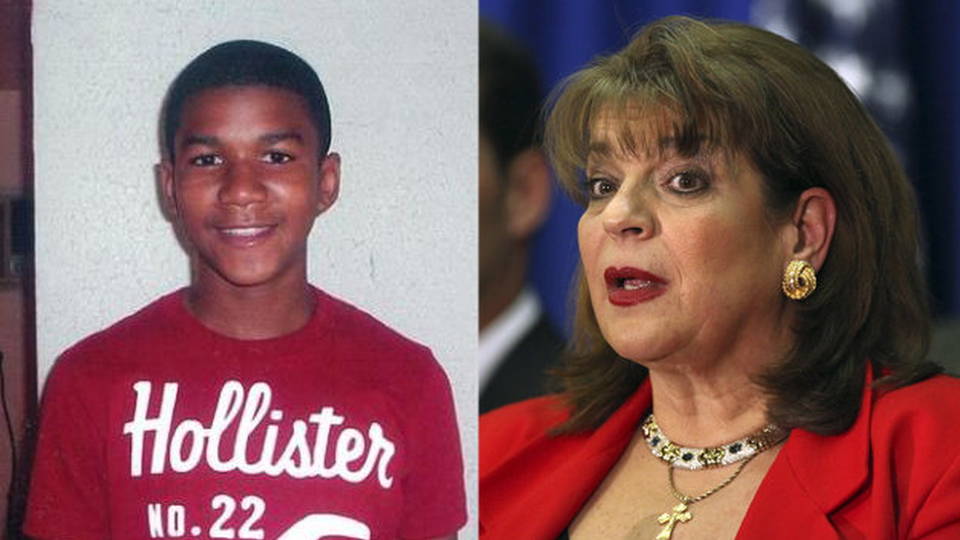 Florida State Attorney Angela Corey was also defeated. Corey had faced widespread criticism for her handling of several prominent cases, including the killing of African-American teenager Trayvon Martin by white neighborhood watch vigilante George Zimmerman and the case of Marissa Alexander, who was sentenced to 20 years in prison for firing what she maintains was a warning shot at her abusive husband. We’ll have more on the primaries later in the broadcast with Jim Dean of Democracy for America.
Florida State Attorney Angela Corey was also defeated. Corey had faced widespread criticism for her handling of several prominent cases, including the killing of African-American teenager Trayvon Martin by white neighborhood watch vigilante George Zimmerman and the case of Marissa Alexander, who was sentenced to 20 years in prison for firing what she maintains was a warning shot at her abusive husband. We’ll have more on the primaries later in the broadcast with Jim Dean of Democracy for America.Veterans Voice Support for NFL Quarterback Colin Kaepernick
 U.S. military members and veterans have taken to Twitter in support of NFL 49ers quarterback Colin Kaepernick, who refused to rise for the national anthem before a preseason NFL game Friday in a protest against police brutality and in solidarity with the Black Lives Matter movement. Some have criticized Kaepernick’s protest, saying it disrespected veterans. But on Tuesday, the hashtag "#VeteransForKaepernick" began trending as vets and military members said they supported the protest. Air Force veteran Sunny Anderson tweeted, "I took an oath & served, so players on a team I don’t even like could have freedom of speech #VeteransforKaepernick."
U.S. military members and veterans have taken to Twitter in support of NFL 49ers quarterback Colin Kaepernick, who refused to rise for the national anthem before a preseason NFL game Friday in a protest against police brutality and in solidarity with the Black Lives Matter movement. Some have criticized Kaepernick’s protest, saying it disrespected veterans. But on Tuesday, the hashtag "#VeteransForKaepernick" began trending as vets and military members said they supported the protest. Air Force veteran Sunny Anderson tweeted, "I took an oath & served, so players on a team I don’t even like could have freedom of speech #VeteransforKaepernick."Southern Poverty Law Center: White Lives Matter is a Hate Group
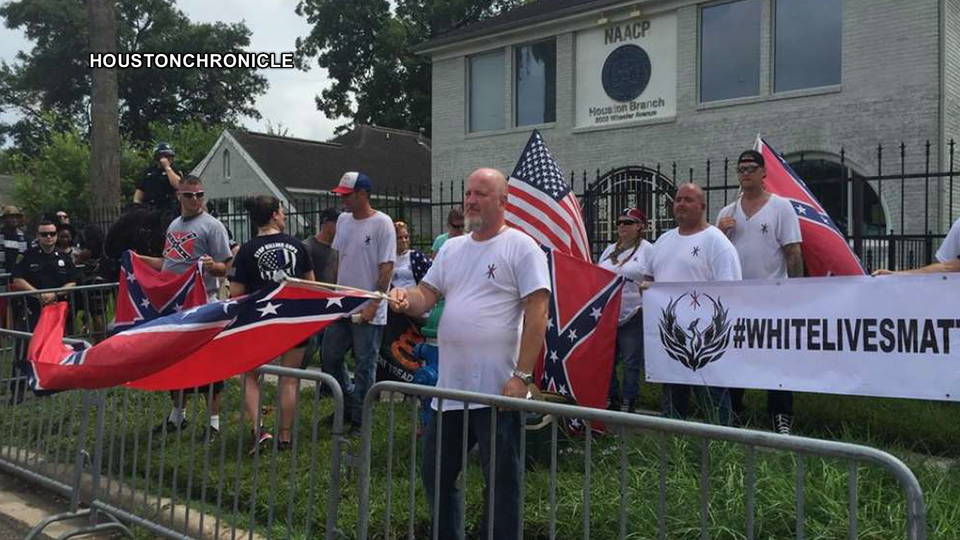 The Southern Poverty Law Center has declared White Lives Matter a hate group. Southern Poverty Law Center said, "The White Lives Matter website says their movement is dedicated to the preservation of the white race. That tells you all you need to know." At one recent White Lives Matter protest outside the NAACP office in Houston, members carried military-grade assault rifles and Confederate flags.
The Southern Poverty Law Center has declared White Lives Matter a hate group. Southern Poverty Law Center said, "The White Lives Matter website says their movement is dedicated to the preservation of the white race. That tells you all you need to know." At one recent White Lives Matter protest outside the NAACP office in Houston, members carried military-grade assault rifles and Confederate flags.ISIS Says Its Spokesman Was Killed in U.S. Drone Strike
 The self-proclaimed Islamic State says one of its leaders was killed in a U.S. drone strike in northern Syria. Abu Muhammad al-Adnani was reportedly ISIS’s top spokesperson and media strategist. The Pentagon has confirmed the U.S. strike, but not whether al-Adnani was killed.
The self-proclaimed Islamic State says one of its leaders was killed in a U.S. drone strike in northern Syria. Abu Muhammad al-Adnani was reportedly ISIS’s top spokesperson and media strategist. The Pentagon has confirmed the U.S. strike, but not whether al-Adnani was killed.Report: U.S. Drone Strike Kills 3 in Yemen
 Meanwhile, Agence France-Presse is reporting Yemeni security officials say a U.S. drone strike has killed three people in southern Yemen. The victims of Tuesday’s strike were suspected to be members of al-Qaeda, according to the U.S. government.
Meanwhile, Agence France-Presse is reporting Yemeni security officials say a U.S. drone strike has killed three people in southern Yemen. The victims of Tuesday’s strike were suspected to be members of al-Qaeda, according to the U.S. government.AP Investigation Documents 72 Mass Graves in ISIS Territory
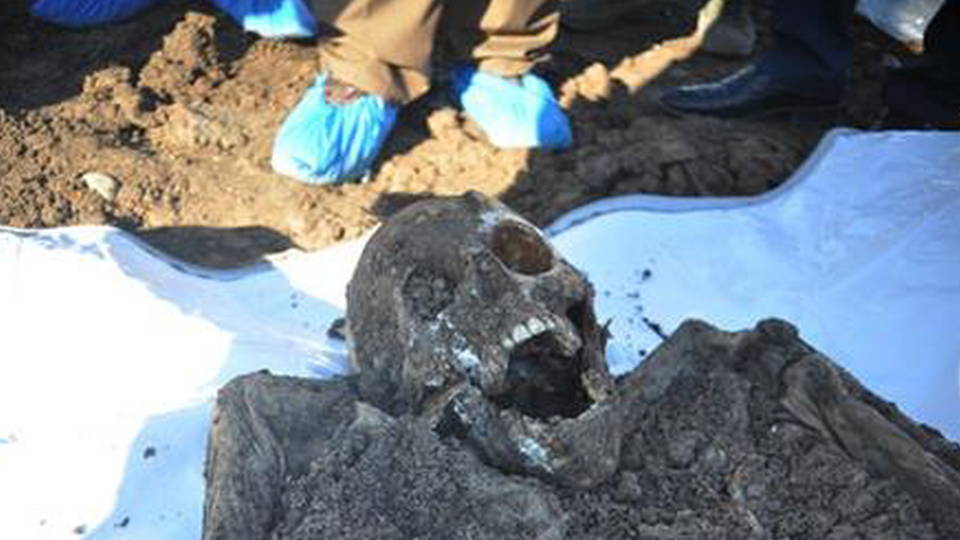 A new Associated Press investigation has documented 72 mass graves across ISISterritory in Iraq and Syria. Most of the graves have not yet been excavated. The AP reports the number of victims could be anywhere from 5,000 to 15,000 people. One of the graves is expected to contain the bodies of as many as 600 prisoners killed during a massacre in June 2014. According to satellite imagery, their bodies may be lined up side to side in a grave stretching the length of two football fields.
A new Associated Press investigation has documented 72 mass graves across ISISterritory in Iraq and Syria. Most of the graves have not yet been excavated. The AP reports the number of victims could be anywhere from 5,000 to 15,000 people. One of the graves is expected to contain the bodies of as many as 600 prisoners killed during a massacre in June 2014. According to satellite imagery, their bodies may be lined up side to side in a grave stretching the length of two football fields.Somalia: 15 Die in Al-Shabab Attack in Mogadishu
 In Somalia, at least 15 people have died in a truck bomb explosion in the capital Mogadishu. Forty-five more people were wounded in Tuesday’s attack near the presidential palace. The militant group al-Shabab has claimed responsibility.
In Somalia, at least 15 people have died in a truck bomb explosion in the capital Mogadishu. Forty-five more people were wounded in Tuesday’s attack near the presidential palace. The militant group al-Shabab has claimed responsibility.Brazil: Massive Protests Continue Amid Rousseff's Impeachment Trial
 In Brazil, massive protests against the impeachment of suspended President Dilma Rousseff have rocked São Paulo for a second day. Thousands took to the streets, blockaded major thoroughfares and lit fires. The police responded by firing flashbang grenades and tear gas at the crowds. This is one of the protesters.
In Brazil, massive protests against the impeachment of suspended President Dilma Rousseff have rocked São Paulo for a second day. Thousands took to the streets, blockaded major thoroughfares and lit fires. The police responded by firing flashbang grenades and tear gas at the crowds. This is one of the protesters.Juliana de Oliveira: "It is not our intention to change the senators’ votes, because we believe that the cards have already been dealt. Our intention is to show that we are going to fight until the end, that we will fight for each and every right they try to take away, so we are going to stay in the street as long as it is necessary."
The Brazilian Senate is expected to vote to impeach Dilma Rousseff as early as later today.
Colombia: Three Environmental Activists Assassinated
In Colombia, three environmental activists who were organizing against illegal mining have been assassinated. Local organizers say activists Joel Meneses, Nereo Meneses Guzmán and Ariel Sotelo were kidnapped by armed gunmen dressed as military officers on Monday. Their bodies were found hours later. Joel Meneses was the founder of the campesino organization CIMA. The murders came the same day the historic ceasefire between the Colombian government and FARC rebels took effect. As many as 300 environmental activists were assassinated in Colombia in 2015.
Obama to Meet with Philippines President Amid Rising Death Toll from "Drug War"
 President Obama is slated to meet with Philippines President Rodrigo Duterte next week amid growing concerns about the rising death toll from Duterte’s so-called war on drugs. At least 2,000 people have already been killed by police or vigilantes in so-called drug operations since Duterte took office two months ago. Human Rights Watch says among the victims are a 5-year-old girl. Police in the Philippines have encouraged vigilantism. This is National Police Chief Ronald dela Rosa urging people to kill drug dealers.
President Obama is slated to meet with Philippines President Rodrigo Duterte next week amid growing concerns about the rising death toll from Duterte’s so-called war on drugs. At least 2,000 people have already been killed by police or vigilantes in so-called drug operations since Duterte took office two months ago. Human Rights Watch says among the victims are a 5-year-old girl. Police in the Philippines have encouraged vigilantism. This is National Police Chief Ronald dela Rosa urging people to kill drug dealers.Chief Ronald dela Rosa: "Do you want to kill them? Kill them. You can kill them, because you are the victims. Go to them, pour gasoline on their houses and burn it down. Show them your anger. These people have long been getting rich. What about you? Your brains are getting small and melting."
EU Orders Apple Pay $14.5 Billion in Back Taxes to Ireland
 European Union officials have ordered Apple to pay $14.5 billion in unpaid taxes to Ireland—the biggest single tax ruling in EU history. The European Commission says Apple received an illegal tax break from Irish officials under which Apple paid a tax rate of 0.005 percent. Apple is one of the largest technology companies in the world.
European Union officials have ordered Apple to pay $14.5 billion in unpaid taxes to Ireland—the biggest single tax ruling in EU history. The European Commission says Apple received an illegal tax break from Irish officials under which Apple paid a tax rate of 0.005 percent. Apple is one of the largest technology companies in the world.911 Calls of Pulse Shooting Massacre Released
 Officials have released the 911 calls from the June 12 massacre at Orlando’s Pulse nightclub. Forty-nine people died during the attack. Most of the victims were young Latino members of the LGBTQ community. The release comes after months of delay during which the FBI asked law enforcement agencies to withhold public records about the shooting. Here is an excerpt of one of the 911 calls.
Officials have released the 911 calls from the June 12 massacre at Orlando’s Pulse nightclub. Forty-nine people died during the attack. Most of the victims were young Latino members of the LGBTQ community. The release comes after months of delay during which the FBI asked law enforcement agencies to withhold public records about the shooting. Here is an excerpt of one of the 911 calls.Caller: "I called you guys, I don’t know, 10 minutes ago. My girlfriend is in hiding in the club Pulse."
911 Dispatcher: "Did she tell you she was in the front or the back bathroom?"
Caller: "She doesn’t know which bathroom she’s at. All she knows is that she’s in the club Pulse, in the bathroom."
Arkansas: Woman Spends 35 Days in Jail for Bouncing $29 Check
In Arkansas, a mother has been released after spending 35 days in a county jail after she accidentally bounced a $29 check five years ago. Nikki Petree was sentenced to jail last month by a judge accused of running a debtors’ prison. Petree had already been arrested at least seven times over the bounced check, and paid at least $600 in court fines—more than 20 times more than the original debt. Petree said, "Every time I go to jail, they’d let me out immediately for $100. They’d turn around and add $600 or $700 more to my bond. I couldn’t afford to pay. They cornered me, and there was no way out from underneath it. I felt overwhelmed and hopeless."
Obama Commutes Sentences of 111 Federal Prisoners
Obama Commutes Sentences of 111 Federal Prisoners
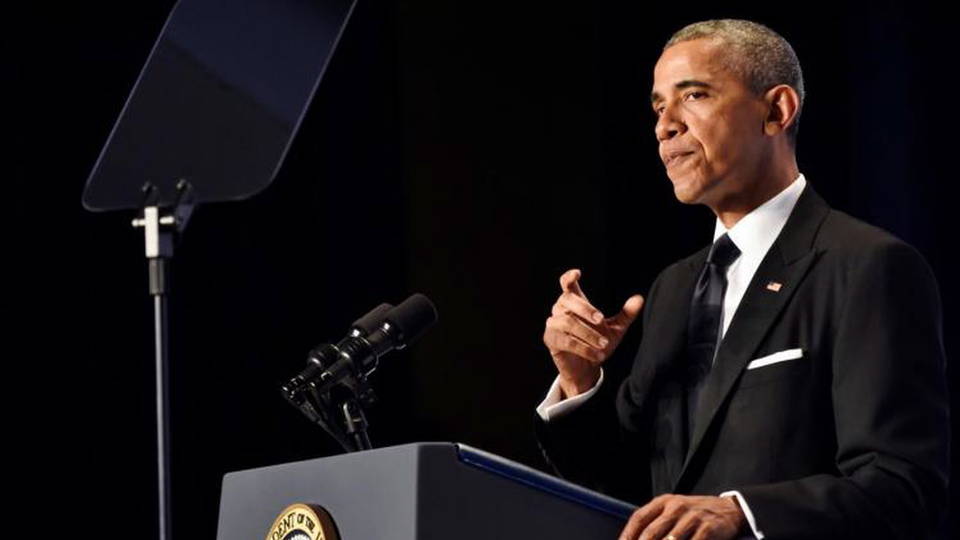 President Obama has commuted the sentences of 111 prisoners serving time for low-level drug offenses. Among those whose sentences will be shortened is Tim Tyler, who was serving a life sentence for possessing LSD while following around the Grateful Dead in his early twenties. In total, Obama has commuted the sentences of 673 prisoners—more than any recent president. There are more than 190,000 federal prisoners currently imprisoned across the United States.
President Obama has commuted the sentences of 111 prisoners serving time for low-level drug offenses. Among those whose sentences will be shortened is Tim Tyler, who was serving a life sentence for possessing LSD while following around the Grateful Dead in his early twenties. In total, Obama has commuted the sentences of 673 prisoners—more than any recent president. There are more than 190,000 federal prisoners currently imprisoned across the United States.New York Public Library Opens Library at Rikers Island Jail
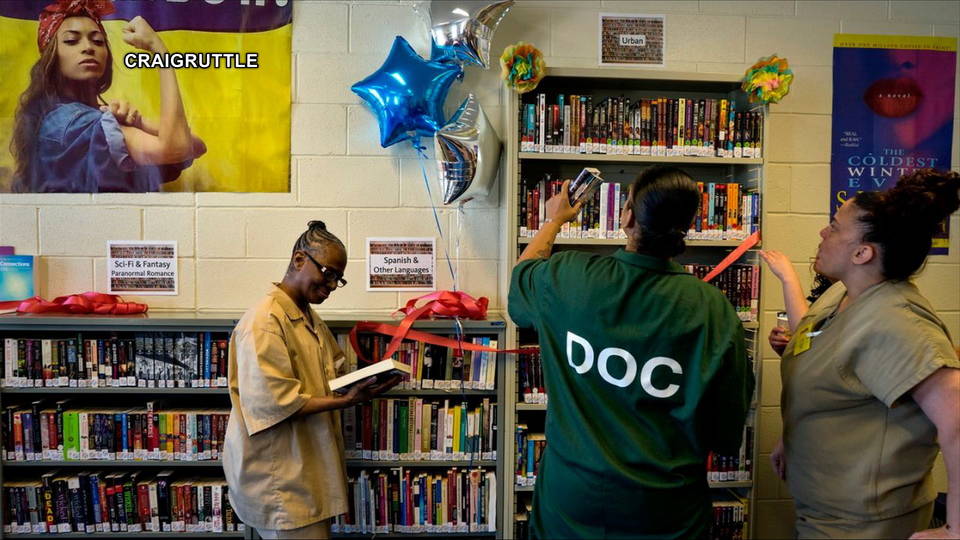 And here in New York City, the New York Public Library has established the first permanent library at Rikers Island. The jail’s new library has 1,200 books, which can be checked out two at a time.
And here in New York City, the New York Public Library has established the first permanent library at Rikers Island. The jail’s new library has 1,200 books, which can be checked out two at a time.-------
Donate today:
Follow:




WEB EXCLUSIVE

Senior TV Producer
207 W 25th St — 11th Floor
New York, New York 10001, United States
-------
-------

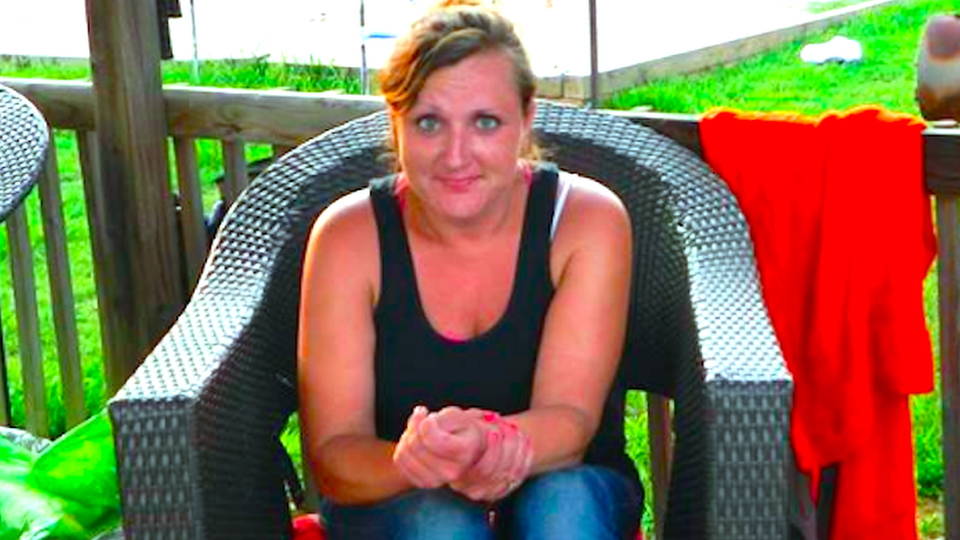


No comments:
Post a Comment